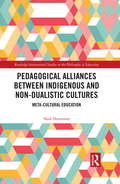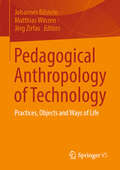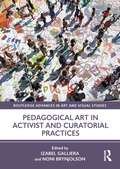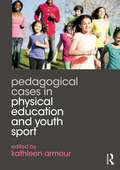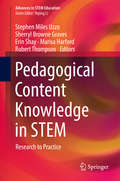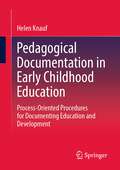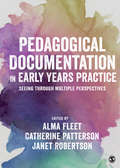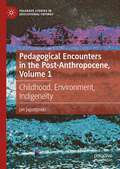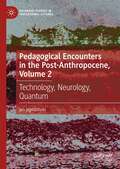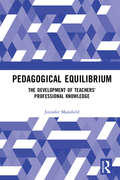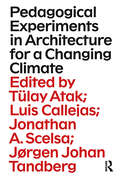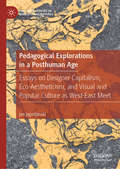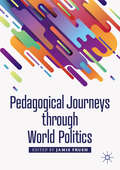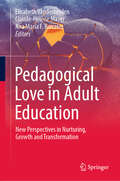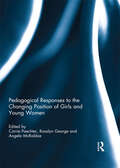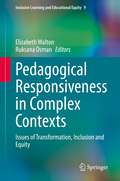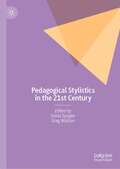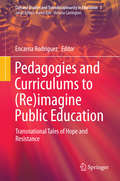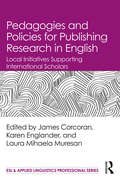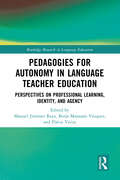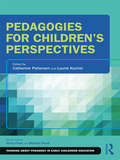- Table View
- List View
Pedagogical Alliances between Indigenous and Non-Dualistic Cultures: Meta-Cultural Education (Routledge International Studies in the Philosophy of Education)
by Neal DreamsonPedagogical Alliances Between Indigenous and Non-Dualistic Cultures examines Indigenous education for authentic intercultural education. It critically reviews various Indigenous cultural and educational perspectives in Western education contexts, addresses relevant meta-cultural concerns, argues for pedagogical alliances cross non-dualistic cultures/religions, and articulates metaphysical approaches to the alliances. Throughout the book, the author argues that methodological enhancement of Indigenous culture can be made by proposing new values that emerge from authentic intercultural interaction, which is transcendental to the binary oppositions of Indigenous and Western education. To do so, the author discovers pedagogical and methodological vulnerabilities of Indigenous culture in Western education systems, and proposes its pedagogical alliances with non-dualistic cultures (such as Buddhist mindful pedagogy, Confucius virtues pedagogy, and Hindu contemplative pedagogy) to overcome the frame of Indigenous and Western cultures for Indigenous education and to strengthen both Indigenous and non-dualistic education. This is the first book to address the issue of why non-Indigenous cultures other than Western cultures have not been considered in Indigenous and multicultural education. As such it is an invaluable text for education academics and post-graduate students specialising in Indigenous education, cross-cultural education, inclusive pedagogy and intercultural education.
Pedagogical Anthropology of Technology: Practices, Objects and Ways of Life
by Johannes Bilstein Jörg Zirfas Matthias WinzenThe volume examines the question of which specifically educational techniques are required in view of the increasing establishment and professionalization of pedagogical fields of work. In this context, an attempt is made to clarify what pedagogical and didactic preparation must take place for an increasingly technically oriented world. In addition, the everyday techniques of self-care are analyzed. And finally, pedagogical anthropology is also concerned with the question of who is the subject and object of technology.
Pedagogical Art in Activist and Curatorial Practices (Routledge Advances in Art and Visual Studies)
by Izabel Galliera Noni BrynjolsonThis edited volume highlights the historical, philosophical and theoretical legacies of pedagogical art and examines its connections with various forms of activism and institutional transformation.Chapters reveal interconnected concerns related to institutional power structures, systemic racism, sexism and gender biases in art institutions, exclusionary tactics of neoliberal corporate interests and the politicization of culture in authoritarian regimes. This volume brings together leading and emerging scholars, curators and artists who have written case studies from various geographical, cultural and political contexts. Through a range of different approaches and diverse perspectives, contributors address key debates and conversations on this topic including the lessons that can be learned from exploring global histories of critical pedagogy, the possibilities and constraints of institutional critique and transformation within museums, universities and other educational institutions, and the many ways in which contemporary pedagogical art has intersected with art and activism around the world. Through these debates, contributors investigate the potential of pedagogical art as a transformative institutional tool with the potential to activate discursive spaces for generating, sharing and amplifying knowledge as a powerful form of collective resistance.This book will be of interest to scholars working in art history, art education and museum studies, among other fields.
Pedagogical Cases in Physical Education and Youth Sport
by Kathleen ArmourPedagogical Cases in Physical Education and Youth Sport is a completely new kind of resource for students and practitioners working in physical education or youth sport. The book consists of 20 richly described cases of individual young learners, each written by a team of authors with diverse expertise from across the sport, exercise and movement sciences. These cases bring together knowledge from single sub-disciplines into new interdisciplinary knowledge to inform best practice in physical education, teaching and coaching in youth sport settings. At the heart of each case is an individual young person of a specified age and gender, with a range of physical, social and psychological characteristics. Drawing on current research, theory and empirical data from their own specialist discipline, each chapter author identifies the key factors they feel should be taken into account when attempting to teach or coach the young person described. These strands are then drawn together at the end of each chapter and linked to current research from the sport pedagogy literature, to highlight the implications for planning and evaluating teaching or coaching sessions. No other book offers such a rich, vivid and thought-provoking set of pedagogical tools for understanding and working with children and young people in sport. This is an essential resource for any student on a physical education, coaching, kinesiology or sport science course, and for any teacher, coach or instructor working in physical education or youth sport.
Pedagogical Content Knowledge in STEM: Research to Practice (Advances in STEM Education)
by Robert Thompson Erin Shay Stephen Miles Uzzo Sherryl Browne Graves Marisa HarfordThis volume represents both recent research in pedagogical content knowledge (PCK) in science, technology, engineering and math (STEM), as well as emerging innovations in how PCK is applied in practice. The notion of “research to practice” is critical to validating how effectively PCK works within the clinic and how it can be used to improve STEM learning. As the need for more effective educational approaches in STEM grows, the importance of developing, identifying, and validating effective practices and practitioner competencies are needed. This book covers a wide range of topics in PCK in different school levels (middle school, college teacher training, teacher professional development), and different environments (museums, rural). The contributors believe that vital to successful STEM education practice is recognition that STEM domains require both specialized domain knowledge as well as specialized pedagogical approaches. The authors of this work were chosen because of their extensive fieldwork in PCK research and practice, making this volume valuable to furthering how PCK is used to enlighten the understanding of learning, as well as providing practical instruction. This text helps STEM practitioners, researchers, and decision-makers further their interest in more effective STEM education practice, and raises new questions about STEM learning.
Pedagogical Documentation in Early Childhood
by Susan StaceyPedagogical Documentation in Early Childhood is an inspiring step-by-step guide to documenting children's ideas, questions, play, and learning in a way that enhances teachers' thinking and understanding at the same time. This book supports teachers on their journey to tell the stories behind children's work and inquiry. Susan Stacey has worked in the early childhood education field for over thirty-five years as an early childhood educator, director, practicum advisor, and instructor in both Canada and the United States. She is a frequent speaker across North America.
Pedagogical Documentation in Early Childhood Education: Process-Oriented Procedures for Documenting Education and Development
by Helen KnaufToday, the documentation of children's education and development is an important part of educational work in early childhood education. This book systematises the topic of pedagogical documentation based on current empirical research. The book analyses different pedagogical reasons for documentation and then presents and discusses different procedures of pedagogical documentation in theory and empirical practice : Portfolio, Learning Stories, pedagogical documentation in the room, project documentation and digital pedagogical documentation. Pedagogical documentation is discussed in the tension between a social constructivist understanding of education on the one hand and a diagnostic logic of fostering on the other. The book is intended as a part of pedagogically oriented childhood research, which also wants to contribute to the reflection and improvement of pedagogical practice.
Pedagogical Documentation in Early Years Practice: Seeing Through Multiple Perspectives
by Alma Fleet Catherine Patterson Jessie RobertsonPedagogical documentation is a vital method of assessing and observing young children, and is a practice that enables practitioners, families and children to learn alongside each other. This book draws on the projects and experiences of senior researchers from nations including Australia, Canada, Sweden, Singapore, the UK and the USA to highlight multiple approaches to pedagogical documentation. Topics explored include: using video in pedagogical documentation making the most of outdoor learning environments developing pedagogical documentation within curriculum frameworks the relationship with Early Years transitions the potential of pedagogical documentation for leadership enactment. The book offers guidance, support and inspiration to practitioners and researchers on how to implement meaningful and sustainable child-focused observation in early years contexts.
Pedagogical Documentation in Early Years Practice: Seeing Through Multiple Perspectives
by Janet Robertson Alma Fleet Catherine PattersonPedagogical documentation is a vital method of assessing and observing young children, and is a practice that enables practitioners, families and children to learn alongside each other. This book draws on the projects and experiences of senior researchers from nations including Australia, Canada, Sweden, Singapore, the UK and the USA to highlight multiple approaches to pedagogical documentation. Topics explored include: using video in pedagogical documentation making the most of outdoor learning environments developing pedagogical documentation within curriculum frameworks the relationship with Early Years transitions the potential of pedagogical documentation for leadership enactment. The book offers guidance, support and inspiration to practitioners and researchers on how to implement meaningful and sustainable child-focused observation in early years contexts.
Pedagogical Encounters in the Post-Anthropocene, Volume 1: Childhood, Environment, Indigeneity (Palgrave Studies in Educational Futures)
by jan jagodzinskiThis volume, the first of a two volume set, addresses three major areas in response to the post-Anthropocene: childhood, environment and indigeneity. Each of these areas is broadly addressed in relation to the concerns that have arisen both theoretically and educationally. The author terms these to be encounters as each area presents a particular problematic when addressing the phase change that the planet is undergoing where the anthropogenic labour of global humanity is contributing to climate change, endangering our very existence. There has been a concerted effort to overcome the nature-culture divide in education. The author reviews this development in the first section where there has been a particular emphasis placed on childhood education. In the second section he turns to the pedagogical theories that are attempting to overcome this same divide in environmental and science education. The last section attempts to bring into the conversation the vast literature on Indigeneity and their attempts to revise traditional education to meet these extraordinary times.
Pedagogical Encounters in the Post-Anthropocene, Volume 2: Technology, Neurology, Quantum (Palgrave Studies in Educational Futures)
by jan jagodzinskiAs a follow up to Pedagogical Encounters in the Post-Anthropocene, Volume I, this book addresses three major areas in response to the post-Anthropocene: Technology, Neurology, Quantum. Each of these areas is broadly addressed in relation to the concerns that have arisen both theoretically and educationally. As in Volume I, the author terms these to be encounters as each area presents a particular problematic when addressing the phase change that the planet is undergoing where the anthropogenic labour of global humanity is contributing to climate change, endangering our very existence. Technology in education has been a significant development. There is a concerted effort to review this development placing stress on the rise of learning machines and algorithms. In the second encounter the vast literature on neurology is addressed, especially neurodiversity and the various symptoms that have emerged in the post-Anthropocene era. The last section reviews issues related to quantum theory as this is fundamental to tensions between physics and metaphysics. The volume concludes with the author’s own pedagogical proposal for the future.
Pedagogical Equilibrium: The Development of Teachers’ Professional Knowledge
by Jennifer MansfieldPedagogical Equilibrium is an innovative reconceptualisation of teachers’ professional knowledge development. The book draws on interview data and in-depth analysis of situations, which challenge teachers’ sense of pedagogical equilibrium in both primary and secondary school contexts. These moments highlight the complexity of teaching and the valuable personal and professional learning opportunities afforded by experiencing and processing moments which create uncertainty during practice. Mansfield considers a variety of aspects of teaching practice, including content knowledge, organising for teaching, organising for learning, and student attitudes and behaviours. Drawing on detailed examples, a new framework is offered to scaffold teacher thinking around moments in practice which can challenge the sense of equilibrium in the classroom. Pedagogical Equilibrium is a highly valuable resource for educational researchers, teacher educators, current teachers and other educational stakeholders.
Pedagogical Experiments in Architecture for a Changing Climate
by Tülay Atak Luis Callejas Jonathan A. Scelsa Jørgen Johan TandbergThis book presents a series of pedagogical experiments translating climate science, environmental humanities, material research, ecological practices into the architectural curriculum. Balancing the science and humanities, it exposes recent pedagogical experiments from renown educators, while also interrogating a designer’s agency between science and speculation in the face of climate uncertainty. The teaching experiments are presented across four sections: Abstraction, Organization, Building, and Narrative, exposing core parts of an architect’s education and how educators can simultaneously provide fundamental skills and constructive literacy while instigating environmental sensibilities. Chapters cover issues such as an unstable hydrosphere, water infrastructure, remediating materials, methods of disassembly and adaptive reuse, as well as constructing new aesthetic categories of climate change, and implementing oral histories of construction, among many others. Written and edited by expert design educators actively engaged in experimenting in new forms of pedagogy, this book will be of great use to architecture instructors at all levels looking to renew their teaching practices to more directly address the climate emergency. It will also appeal to those academics across the built environment interested in the ways design can affect and adapt to climate change.
Pedagogical Explorations in a Posthuman Age: Essays on Designer Capitalism, Eco-Aestheticism, and Visual and Popular Culture as West-East Meet (Palgrave Studies in Educational Futures)
by jan jagodzinskiThis book problematizes the role of education in an increasingly mediatized world through the lenses of creativity, new media, and consumerism. At the core of the issue, the author argues, creativity in art education is being co-opted to serve the purposes of current economic trends towards designer capitalism. Using an East meets West approach, jagodzinski draws on Deleuze and Guattarian philosophy to explore visual and popular culture in Korean society, addressing the tensions that exist between designer education and art that explores the human condition. In doing so, he challenges art educators to envision a new paradigm for education which questions established media ontologies and incorporates new ways to confront the crisis of the Anthropocene.
Pedagogical Innovation for Children's Agency in the Classroom: Building Knowledge Together
by Federico Farini Angela ScollanThis book introduces the use of facilitation to support children’s agency in the classroom as authors of knowledge. The authors draw on research undertaken in two Year Three classrooms, in which children were invited to share photographs in a workshop to facilitate the sharing and creation of narratives. Motivated by the idea that elevating children’s status to constructors of knowledge is essential for a pedagogy of authentic listening, understandings of childhood are challenged in relation to the UN Convention on the Rights of the Child and the tension between self-determination and the protection of children. The book will be of interest to academics, students and practitioners in the areas of education, early childhood studies, sociology of childhood, social work, children’s rights and educational management.
Pedagogical Journeys through World Politics (Political Pedagogies)
by Jamie FruehThis edited volume is a collection of twenty-three autobiographical narratives by successful teachers of global politics and international relations. The diverse contributors (from a variety of institutional contexts, sub-disciplines, and countries) describe their development as teachers, articulate mission statements for their teaching, and link both to pedagogical practices that exemplify their teaching philosophies. Rather than provide specific recipes for authoritative techniques, the essays empower readers as creative developers of their own approaches to teaching global politics. They demonstrate the multiple ways that instructors have grounded deliberate pedagogical designs in a variety of deeper philosophical commitments, and resources are provided to facilitate discussion and collaborative deliberation between groups of readers.
Pedagogical Love in Adult Education: New Perspectives in Nurturing, Growth and Transformation
by Elisabeth Vanderheiden Claude-Hélène Mayer Ana Maria F. BarcelosThis volume explores the concept of pedagogical love, highlighting its role as a transformative force across diverse educational contexts, historical developments, and its integration into educational systems. It provides both theoretical insights and methodological approaches to pedagogical love. The book opens with foundational chapters introducing the concept and progresses to situating it within frameworks such as decolonisation and critical pedagogy. It further examines its potential in teacher education, addressing specific pedagogical domains such as second language acquisition and literacy, as well as cultural contexts spanning Asia, Europe, Africa, and the Americas. Moreover, the book investigates the implications of pedagogical love in current transformations and digitalisation, with particular attention to fully digital environments and artificial intelligence. By offering a comprehensive overview and presenting innovative perspectives for research in adult education, this book serves as an essential resource for researchers, educators, and practitioners. "This edited collection delves into the transformative power of pedagogical love in adult education, challenging conventional views of love as merely &‘soft&’ and personal. By exploring critical and decolonial perspectives, the book opens new avenues for research and practice, advocating for love as a profound ethical and political force to confront social injustices and transform educational spaces…Bridging critical and decolonial approaches, this volume reimagines pedagogical love as a key to transformation in adult education. It moves beyond sentimental notions to show how love can address challenges like violence, colonialism, and social inequity, offering a renewed perspective on love&’s role in shaping the future of education" Michalinos Zembylas, Open University of Cyprus "Pedagogical love is the root and foundation of all adult education" Kaarina Määttä, Professor (emerita), University of Lapland
Pedagogical Opportunities of the Review Genre: Learning in Cultures of Evaluation (Routledge Research in Media Literacy and Education)
by Maarit JaakkolaPedagogical Opportunities of the Review Genre unleashes the pedagogical potential of the review genre, reframing the act of reviewing of cultural products as a communicative practice from a pedagogical perspective.Negotiating between traditions of journalism and media studies and pedagogy, the author presents a novel approach that will increase the readers’ understanding of an activity that is on the increase in an era where 'everyone can be a critic'. She identifies, describes, and develops genre-based pedagogies in formal, non-formal, and informal contexts of learning and teaching, in order to recontextualize the review as a form of learning and rethink of its potential as an inclusive, engaging, and a transformative critical cultural practice.This innovative and truly interdisciplinary study will interest students and researchers in the areas of media literacy, digital media, media and communication studies, cultural studies, sociology of arts, and pedagogical studies – in particular, cultural journalism and criticism, audience studies, cultural production, and cultural mediation, as well as critical media pedagogy and literacy studies.
Pedagogical Responses to the Changing Position of Girls and Young Women
by Carrie Paechter, Rosalyn George and Angela McRobbieAcademics and professionals working with young women face a series of paradoxes. Over the last 20 years, the lives of young women in the UK and Europe have been transformed. They have gained considerable freedom and independence, but at the very same time, new, less tangible forms of constraint and subordination now play a defining role in the formation of their everyday subjectivities and identities. Young women have come to exemplify the pervasive sensibility of self-responsibility and self-organisation. This new ‘gender regime’ demands both conceptualisation and practical response, drawing on educational research, social and cultural theory, and contemporary feminist thought. Within the overarching theme of pedagogical responses to these trends, through work in schools and within young women’s online and face-to-face communities, this book interrogates the field of sexuality and its visualisation across new and old media in the context of often predictable and endemic ‘moral panics’ about teenage pregnancy rates, sexually transmitted diseases, and internet pornography. In exploring how girls and young women respond to increasing expectations of them as the vanguard of economic, social, and cultural change, contributors to this volume interrogate the ways in which social and educational aspiration interact with young women’s developing and embodied identities. This book was originally published as a special issue of Pedagogy, Culture and Society.
Pedagogical Responsiveness in Complex Contexts: Issues of Transformation, Inclusion and Equity (Inclusive Learning and Educational Equity #9)
by Ruksana Osman Elizabeth WaltonThis book reflects a range of pedagogical responses to increasingly complex educational contexts. It finds this complexity in the interplay of a number of factors, including the diverse histories and identities of educational actors; institutional and systemic demands and constraints; competing conceptions of valued knowledge; and technological change. The chapters show the demand for pedagogical response to unexpected and unprecedented events (like COVID-19) and the importance of addressing barriers to access that become sedimented into institutional cultures. The authors, mostly from Global South contexts, are concerned with enabling educational access and inclusion in the face of competing global and local demands. They present new knowledge about pedagogical approaches that are relevant and effective in uncertain times and challenging places. Together, the contributors offer accounts of hope-full and innovative practice and conceptually rigorous engagement with fundamental issues of learning and teaching.
Pedagogical Stylistics in the 21st Century
by Sonia Zyngier Greg WatsonThis edited book provides cutting edge contributions from an international array of prominent experts who discuss the relevance of pedagogical stylistics in relation to diverse contexts and areas, including empirical approaches, corpus stylistics, creative writing, literary-linguistic criticism, students as researchers, critical discourse, academic register, text-world pedagogy, cognitive stylistics, classroom discourse, language of literary texts, L1/L2 education, EFL learners, and multimodal stylistics. Intended as a follow-up to Watson and Zyngier (2007), this volume situates the reader by offering a broad assessment of how the field has developed during the past 15 years and where it stands now. By examining both contemporary research and future challenges, it should be regarded as essential reading for all teachers, researchers, scholars, and students interested in understanding language and how to apply stylistics in educational settings. This book will be of interest to students and scholars working in stylistics, cognitive linguistics, language teaching, applied linguistics, literary studies, and materials development.
Pedagogies and Curriculums to (Re)imagine Public Education
by Encarna RodríguezThis book discusses current market-based educational discourses and how they have undermined the notion of "the public" in public education by allowing private visions of education to define the public democratic imagination. Against this discouraging background, this text embraces Freire's understanding of hope as an ontological need and calls for finding new public grounds for our public imagination. It further articulates Freire's mandate to unveil historically concrete practices to sustain democratic educational visions, no matter how difficult this task may be, by (1) presenting an indepth description of the pedagogies and curriculums of eleven schools across historical and geographical locations that have worked or are still working with disenfranchised communities and that have publicly hoped for a better future for their students, and by (2) reflecting on how the stories of these schools offer us new opportunities to rethink our own pedagogical commitment to public visions of education. To promote this reflection, this book offers the notion of publicly imagined public education as a conceptual tool to help understand the historical and discursive specificity of schools' hopes and to (re)claim public schools as legitimate sites of public imagination.
Pedagogies and Policies for Publishing Research in English: Local Initiatives Supporting International Scholars (ESL & Applied Linguistics Professional Series)
by Karen Englander James N. Corcoran Laura-Mihaela MuresanOffering a nuanced examination of the complex landscape that international scholars who publish their research in English must navigate, this edited volume details 17 perspectives on scholarly writing for publication across seven geolinguistic regions. This innovative volume includes first-hand accounts and analyses written by local scholars and pedagogues living and working outside Anglophone centres of global knowledge production. The book provides an in-depth look into the deeply contextualized pedagogical activities that support English-language publishing. It also brings much-needed insight to discussions of policies and practices of global scholarly research writing. Bookended by the editors’ introductory overview of this burgeoning field and an envoi by the eminent applied linguist John M. Swales, the diverse contributions in this volume will appeal to scholars who use English as an additional language, as well as to researchers, instructors, and policymakers involved in the production, support, and adjudication of global scholars’ research writing.
Pedagogies for Autonomy in Language Teacher Education: Perspectives on Professional Learning, Identity, and Agency (Routledge Research in Language Education)
by Flávia Vieira Manuel Jiménez Raya Borja Manzano VázquezThis book aims to challenge established teaching cultures to promote teacher autonomy and autonomy-oriented pedagogies in language teacher education.Offering a set of inspiring case studies that illustrate language teacher education for autonomy as a space of multiple possibilities, the book fuses theory and practice and gives a holistic view of the changing landscape of language teacher education, accounting for the transformative power of educational practices that help teachers think and act in informed, context-specific, and learner-centred ways. It also demonstrates the importance of autonomy in language teacher education contexts, specifically to foster teachers’ professional learning, identity, and agency, as well as in assessing and reshaping teacher education programmes.This book will be particularly useful to researchers, scholars, and postgraduate students in the fields of teaching and teacher education, modern foreign languages, and teaching and learning language research more broadly. Curriculum designers and language teacher education programme directors may also find the volume of use.
Pedagogies for Children's Perspectives (Thinking About Pedagogy in Early Childhood Education)
by Catherine Patterson Laurie KocherLaurie Kocher is a Faculty member in the Department of Early Childhood Care and Education, Capilano University, Canada. Catherine Patterson is Senior Lecturer at the Institute of Early Childhood, Department of Educational Studies, Macquarie University, Australia.
